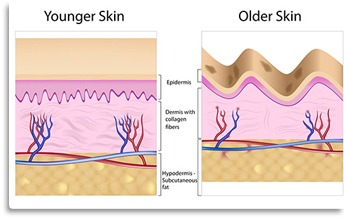Skin Elasticity
By the time we are twenty years old, we lose a significant amount of the skin’s elasticity. It’s not really the “stretchiness” of your skin as many people tend to think it is; that’s only half the definition. If elasticity were to be defined as only how stretchy something can be, then your skin would be quite inelastic since we can’t really stretch it all that much without it breaking. In order to be elastic you need to be stretchy to begin with but elasticity has a return trip (a “bounce back”); stretchiness alone does not. Imagine stretching a rubber band. As soon as you let go of one end, the rubber band goes back to its original shape; that property is known as elasticity.
Nine Reasons Why Your Skin Could Stop Being Stretchy
If you pull your skin and it quickly pops back into place, then it’s very elastic. If you pull your skin and it very slowly sinks back down then it’s not as elastic. Elasticity is therefore a relative term.
There are a few reasons why your skin sags (stretches) with age and isn’t as elastic (cannot bounce back into shape as quickly as it could in your youth).
One of the microscopic substances that makes up your skin is known as collagen. Collagen is nothing more than a protein that is twisted in a helical shape; like a DNA molecule. However, collagen has three strands instead of two. Collagen’s shape helps to keep your skin strong and firm and confers some elastic properties as well.
While collagen does have elastic properties, there is a protein in your skin that is more involved in the elasticity of it: this protein is called elastin. This property allows your skin to pop back into place after some kind of force depresses it or pulls it out of position. Unfortunately with age, collagen’s and elastin’s ability to function properly declines due to many reasons. Here are just a few:
1) Aging: Wrinkles are a common factor with the aging process. Loss of elasticity is a normal occurrence after the age of 40. However, the initial signs of aging skin begin after 25 years old. During and after this time, blood vessels decrease its number, skin cells are slow to reproduce or do not produce at all and hormones change. All these contribute to the loss of skin elasticity and increases skin-tightening problems.
2) Genes: this is probably the biggest factor in determining why and when your skin will lose elasticity, sag, and form wrinkles. Keep in mind that you can maximize your genetic potential only up to a certain point but you can destroy it far more quickly by not protecting and taking care of your skin.
3) Smoking: It’s a well established fact that this causes damage to the skin through one of several ways. The first is the fact that smokers will purse their lips and often furrow their brows and squint their eyes when they actually smoke. However, it’s really less about that and more about the fact that cigarettes contain substances that negatively affect collagen synthesis, increase its breakdown, while simultaneously diminishing nutrient delivery to the skin.
4) U.V. Radiation: Skin elasticity can be lost without the proper protection from the harmful rays of the sun. The sun damages elastin fibres in the skin which help to maintain elasticity. The build-up of damaged elastin fibres result in old and wrinkled skin. As well, exposure to too much of the wrong kind of U.V. radiation essentially bombards your proteins in the skin and that destroys the collagen directly. In addition, U.V. radiation can cause the DNA in skin cells to undergo genetic mutations that will lead to skin cancer.
5) Stress: When your body is under a lot of stress it releases a stress hormone known as cortisol. This hormone causes all sorts of problems that lead to inflammation of the skin. For example, it can lead to inflammatory breakouts that we typically get as teenagers. This inflammation, over the long term, in and of itself can destroy collagen and elastin and this can then lead to things like acne scars. If that wasn’t bad enough, cortisol is also a hormone that slows down the reparative mechanisms in your skin and has been implicated in the destruction of collagen directly. This means that just because you aren’t getting breakouts, which may be a sign of stress, that doesn’t mean cortisol isn’t destroying your skin right now.
6) Sleep: If you don’t get enough sleep you can suffer a lot of ill effects; but you already knew that. However, did you know that not only will lack of sleep cause stress but that it’s during our sleep that a lot of repair and regeneration of our skin takes place? If you don’t get enough sleep, you won’t give your body enough time to properly heal itself. So get your beauty sleep!
7) Diet: It’s been shown that eating too much stuff with sugar can cause your skin to start sagging prematurely due to a process called glycation. What basically occurs during glycation is that the sugar you eat begins to attach itself to elastin and collagen, thereby disrupting the normal cohesiveness of your skin, which therefore causes it to wrinkle and sag.
8) Weight Loss: Excessive weight loss, during a short period of time, can also cause the loss of skin elasticity resulting in sagging skin. This is because of the drastic and fast change that the body undergoes and the skin’s inability to keep up with this process.
9) Other Factors: Various other factors also contribute to the loss of skin elasticity. For example, sleeping in the same position can also cause the skin on that side of the face to wrinkle and sag.
Treatment Options to help skin elasticity
- Micodermabrasion
- Photo facial/Rejuvenation
- Intracel Treatment
- Organic Peel
- Maintenance facials
At Lina Diminno Med Spa, we provide Skin Elasticity Treatment in King City, Vaughan, New Market, Richmondhill, Barrie, Sharon, Bradford, and Queensville areas.







